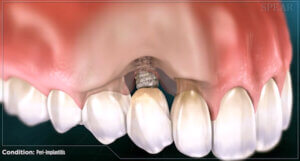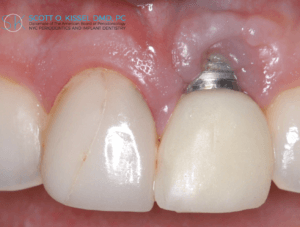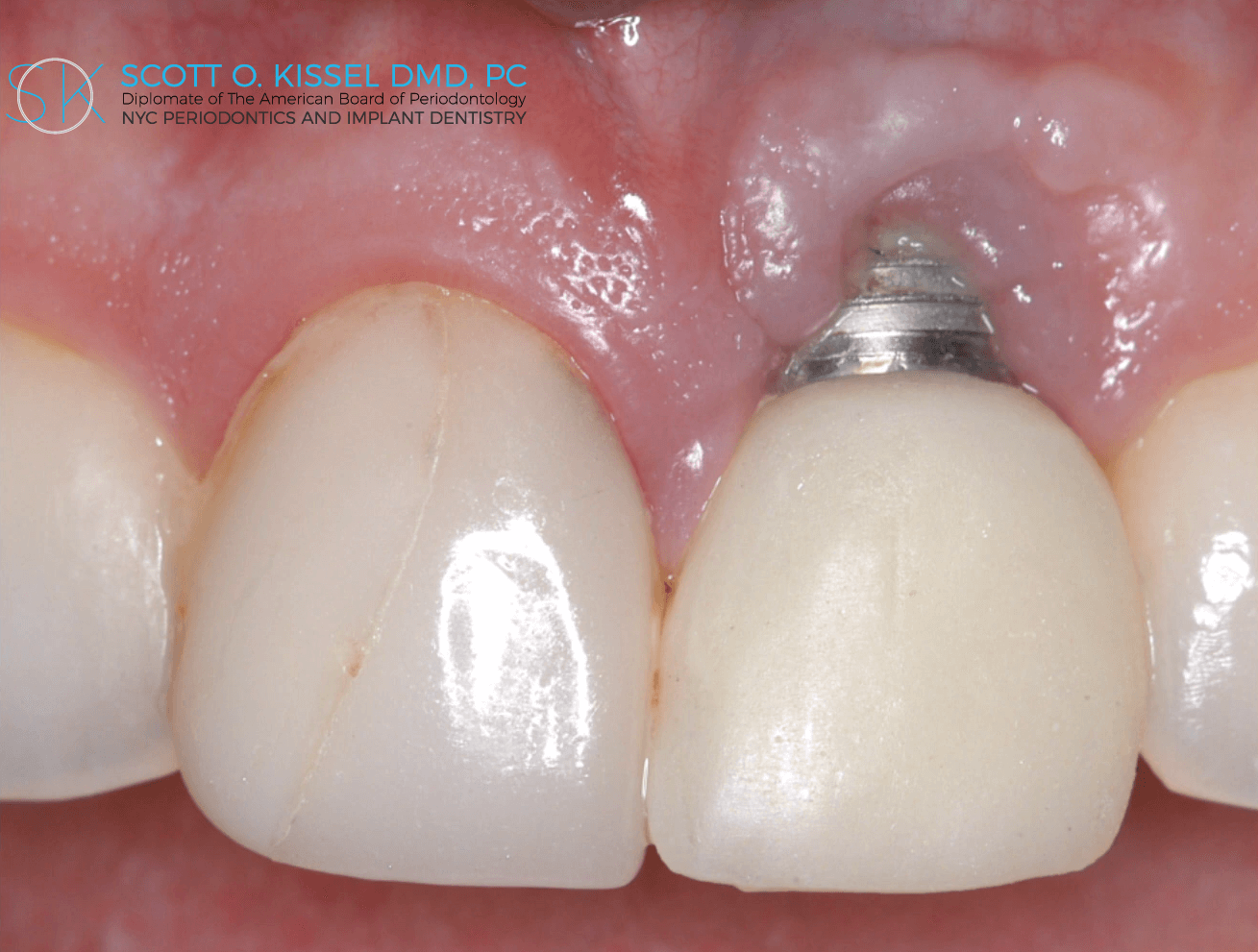Teeth implantscan be an exciting way to achieve the smile you’ve always wanted. They offer a fantastic solution for both patients who have lost teeth and those who extremely damaged teeth that will need to be replaced. In this blog post, we take a look at one of the main issues associated with teeth implants called peri-implantitis (PI), as well as ways to avoid this issue.
What is Peri-Implantitis

Peri-implantitis occurs when bacteria gets trapped in the gum tissue around the implant and starts to grow there. If left untreated, it can lead to loss of the supporting bone and eventually tooth implant failure. As a result, the implant will need to be replaced and there may be a need for additional surgical procedures like a bone graft.
What Can Cause Peri-Implantitis
In a recent study, the prevalence of PI over an average of about 7 years was found to be around 16% of all implants. There are several factors associated with peri-implantitis such as ill-fitting / ill-designed teeth implants, lack of attached periodontal tissue around your implants, poor dental hygiene, periodontal disease, or heavy smoking and alcohol consumption. However, if you do get it, peri-implantitis is easily treatable if caught quickly.
Poor Dental Hygiene
The bacteria that can cause peri-implantitis can gradually build up around teeth implants and gum lines if you do not practice proper oral hygiene (please read our article Proper Oral Hygiene for Your Dental Implants). If you practise proper oral hygiene, you will minimize plaque and tartar that contains the bacteria which cause gum disease.
Gum disease (periodontal disease) can significantly increase the risk of developing peri-implantitis. Fortunately, if your periodontal disease is treated before your dental implant placement, the risk can be lower. That is why most implant specialists insist that any gum disease issues are treated before considering dental implants.
Weak Immune System
If your immune system is weakened by systemic illnesses, your body may not be able to fight infection as effectively and you may have a higher risk for peri-implantitis. For example, if you have diabetes, you should consult with your implant specialist since diabetics who have difficulty controlling their glycemia are at a greater risk of developing peri-implantitis. Dr. Kissel adjusts dental implant treatments accordingly to ensure a greater success rate for his diabetic patients.
Another health issue that has been found to be associated with peri-implantitis is obesity. You might be aware of the many health issues resulting from this condition. With respect to PI, obesity may increase the risk because it causes a generalized and constant hyper-inflammatory state. This state can affect the immune response by increasing the production of pro-inflammatory cytokines. This can have a negative effect on periodontal tissues and alveolar bone levels.
Lifestyle Choices and Habits
Lifestyle choices like smoking (cigarettes, smokeless tobacco, and vaping) can affect your immune response and wound healing. Studieshave found that smokers are twice more at risk of developing PI and if they do develop it, the severity of PI lesions is more serious and difficult to treat.
Symptoms of Peri-Implantitis

🦷️ Redness, swelling, and pain in the gum tissue around your implants.
🦷️ Bleeding gums due to infection.
🦷️ Receding gum line.
🦷️ Implant threads begin to become visible.
🦷️ Your implant begins to feel looser.
🦷️ You notice pus or an unpleasant taste from within the gums around the implant.
🦷️ Sore jaw due to bone deterioration.
🦷️ Swollen lymph nodes around your neck or armpits.
It’s important that you do not ignore any pain or discomfort around your dental implants. Also, if you have any pain or sensitivity while eating or drinking you should book an appointment with your dental implant specialist.
How to Avoid Peri-Implantitis Issues
Proper oral hygiene and regular visits to your dentist are vital in helping you maintain your dental implants in excellent condition for a lifetime. However, you also need to choose a dental implant specialist who uses high-quality dental implants with years of proven clinical success in order to reduce the risk of PI. As a periodontist who has placed thousands of implants in the mouths of New York City residents for over 25 years, Dr. Kissel is committed to excellence. He only uses the most researched and tested implant systems available on the market from Straumann and Nobel Biocare. Using such advanced and studied implants for your surgery helps give you an edge at achieving implant success.
What’s more, before your implant surgery, your implant specialist needs to ensure that you have enough bone thickness to support the implant and that your gum tissue is healthy. A periodontist, like Dr. Kissel, is a specialist who can diagnose bone and gum tissues and if warranted, regenerate both hard and soft tissues to maximize the success of your dental implant. In order to regenerate the needed tissue, Dr. Kissel uses microsurgerysince it is the most minimally invasive technique to assist in implant placement and bone/soft tissue augmentation.
Microsurgery Can Increase your Dental Implant Success
Guided microsurgery surgery leads to more precise implant placement and minimizes the risk of PI. Moreover, microsurgery results in an easier and faster recovery time period due to the use of smaller and more accurate instruments which cause less trauma to the surgical site than traditional techniques. Because Dr. Kissel uses microsurgery techniques, he can operate without causing major incisions and trauma to sensitive tissue, muscles, and nerves. Additionally, because he only makes small incisions with micro-instruments, your surrounding gum tissue will appear normal after surgery.
Consult an Experienced Dental Implant Specialist
The success of your implant procedure can depend on many factors, one of which is finding the right dental implant specialist to help you reclaim your beautiful smile and the full functionality of your teeth. Start by booking your dental implant consultation with Dr. Kissel. During your consultation, he will perform a complete oral examination and explain the dental implant procedure to you, including tooth removal (if needed) and dental implant placement using microsurgery techniques.
If you already had dental implant surgery but are having issues with your teeth implants, you should also contact Dr. Kissel in order to advise you on the best possible treatment for your dental implant problems.
Schedule your consultationtoday at Dr. Kissel’s Manhattan periodontal office between E 52nd St. and E 53rd St.
